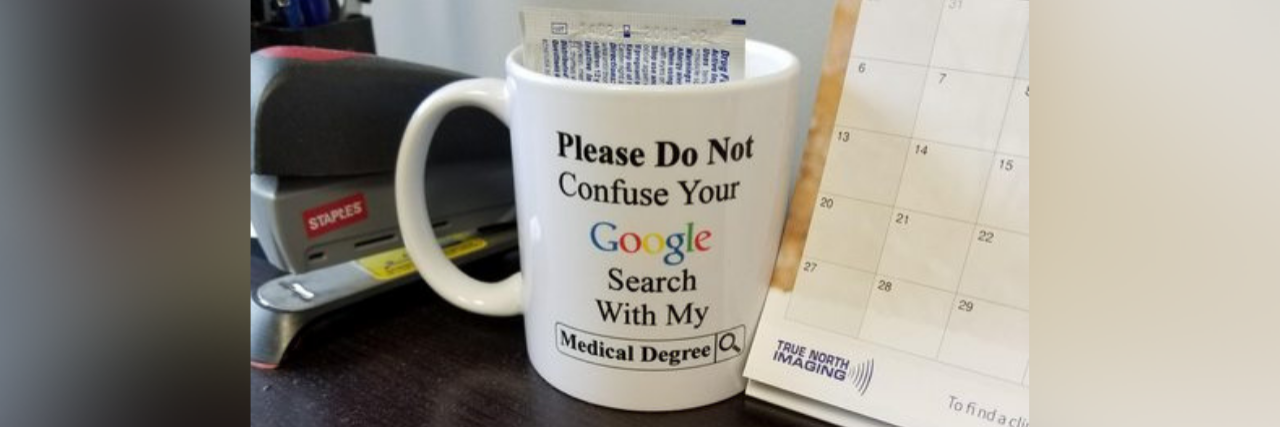Photo Shared on Reddit Reveals How Tenuous the Patient-Doctor Relationship Can Be
Sometimes the news isn’t as straightforward as it’s made to seem. Paige Wyant, The Mighty’s chronic illness editor, explains what to keep in mind if you see this topic or similar stories in your newsfeed. This is The Mighty Takeaway.
Regardless of your health situation, doctors are supposed to be the experts you can trust to oversee your care and act in your best interest. Patients and doctors should be able to respect one another and work together as a team to give the patient the best quality of life possible. But for those of us with chronic illness, the patient-doctor relationship can be trickier to navigate, sometimes leading to tension or disputes between the two parties.
On Jan. 15, Reddit user u/nthensome shared a photo of a mug they noticed in their doctor’s office that read, “Please do not confuse your Google search with my medical degree.” The image has since gotten over 2.5 million views.
This coffee mug in my doctor’s office telling it like it is. from pics
While there is, of course, a huge difference between the many years of intense studying and training it takes to earn a medical degree, and the two minutes it takes to Google a list of symptoms, having this message printed on a mug for patients to see sends a clear and intentional message: “My knowledge is superior to yours.”
This message is problematic for several reasons:
1. Doctors may have a great deal of medical knowledge and experience, but patients do, too.
There is no substitute for med school; what a doctor learns and experiences is incredibly valuable. However, the message on the mug reduces a patient’s knowledge to quick Google searches, ignoring both their lived experiences and their ability to conduct in-depth research.
First of all, we shouldn’t underestimate the value of a person’s knowledge of their health and body. A doctor might be the world’s leading expert on a particular illness, but only patients can tell us what it’s really like to live with that condition – what symptoms and side effects they experience, which treatments do and don’t help, how it affects their everyday life, and so on.
Maybe a quick Google search and scan of the first article that comes up won’t relay much information, but many of us with chronic illness research like we have a school assignment due at the end of each week. Some might be undiagnosed and desperately seeking answers, so they spend weeks or months scouring articles and forums and blog posts, searching for experiences that sound like theirs. Others might have tried every treatment for their illness available, only to find that nothing has worked, so they check scientific journals and news articles and comments sections, looking for a new strategy to try.
When patients do their own research, it’s generally not intended to “one-up” the doctor, or suggest that the information is somehow equivalent to the doctor’s entire medical school education. We’re simply trying to play an active role in our own healthcare.
2. Doctors are knowledgeable, but not about every condition.
It’s true, doctors generally have way more medical knowledge than your average patient. But medical school typically doesn’t train doctors in depth on every single disease out there. There are an estimated 7,000 rare diseases alone – what are the chances a doctor is an expert on every single one of them?
One of the biggest problems chronic and rare disease patients face is getting a diagnosis. This could be because a doctor simply isn’t aware of their disease, but there are a host of other common issues as well: doctors not believing patients, doctors thinking patients’ symptoms are psychosomatic, doctors misdiagnosing patients, etc. So many struggle to get properly diagnosed that they turn to the internet to do their own research and come up with a few possibilities to bring to their doctor.
Unfortunately, there are many doctors who ascribe to the idea that they are automatically more knowledgeable about medicine than any patient conducting internet research (sound familiar?). But what happens when a patient has done intensive, diligent research and believes they might have a particular condition, so they bring this theory to their doctor – only, their doctor has never heard of this condition and has a similar mug sitting on their desk. Will the patient ever receive a diagnosis?
A doctor may not know what exactly is going on with a person’s health – and that’s OK. Perhaps they do some research, investigate potential diagnoses, or refer their patient to a different specialist who might be able to help. It’s never OK for them to admonish their patient for doing their own research, asking questions and making suggestions. Appointments should not be competitions of who knows more than who.
3. Doctors and patients should function as a team, not a hierarchy.
It’s important to find a doctor who treats you with respect and consideration, who understands that each individual brings valuable knowledge and a unique perspective to the table. Power dynamics, even in a patient-doctor relationship, can be toxic, and result in the patient not receiving the quality of care they deserve. (Mighty contributor Dominique Losen recommends these tips for cultivating a successful patient-doctor relationship.)
When you are your doctor are supposed to be players on the same team, how would this mug make you feel? What would you do if you saw this in your doctor’s office? Let us know in the comments below.
Lead image via u/nthensome on Reddit

